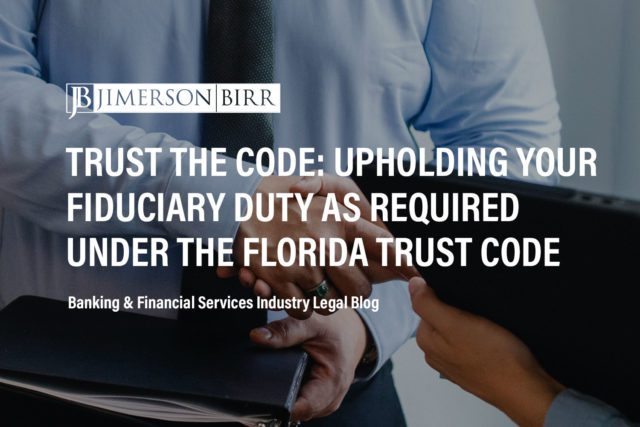FLORIDA TRUST LITIGATION
At Jimerson Birr, our attorneys handle all types of claims involving trust disputes on behalf of trustees, beneficiaries, or any other interested parties. Many such disputes can be resolved outside of court using informal negotiations or formal mediation, but we are well-equipped to fight for your best interests in court, if necessary to vindicate your rights.
Our team appreciates and understands the complexities of trust instruments and the potential for them to create problems for settlors while they are still alive, which can be highly emotional, particularly when cases involve family members or loved ones. We have years of trial experience in litigation involving Florida trusts both representing beneficiaries involving the actions of trustees and defending trustees from lawsuits brought against them by beneficiaries or other interested parties.
Florida law provides grounds for contesting a trust, which can be initiated by any interested party wishing to bring an action to change the trust in any way, including challenging trust validity, interpreting its provisions, setting aside certain conveyances, changing beneficiaries, or removing trustees. Other common reasons for trust litigation include:
- Breach of fiduciary duty
- Excessive trustee compensation
- Forgery and alteration of instruments
- Lack of mental capacity or undue influence of a grantor
- Surcharge of a trustee or removal of a trustee
- Self-dealing
- Trust fraud
- Unclear or confusing language
- Trustee investment losses
The experienced trust litigation lawyers at Jimerson Birr can help you whether you are a trustee, beneficiary, or other interested party. From simple claims to highly complex, we have helped numerous clients resolve their Florida trust-related disputes. Often, they start with simple concerns, like:
- “The Trustee will not tell me anything about the Trust or is not forthcoming with information.”
- “Can I terminate an old trust that no longer serves a purpose?”
- “I am not receiving any distributions from the Trust from the Trustee for more than a year.”
- “Do the obligations for a Trustee really change with a discretionary trust?”
If you’re concerned about the handling of a trust, contact us today to get on a path to resolution.
What is a Trust? Purpose, Ownership, and Key Terms
A trust is a legal entity created under the law owner to hold property for the benefit of another. This can include real property like land or homes or commercial real estate, as well as personal property like, cash, stocks, and other investments, among other things. Each trust will have a very specific purpose for existing. A trust can own, buy and sell property of all types, and can exist for a specific length of time or for an unlimited amount of time. In some cases, a property owner may formally transfer property into the trust, while in others, the owner may declare (through the trust instrument) that certain property is held in trust. In either case, the owner relinquishes individual ownership rights to the trust. Under Florida law, the person creating the trust is called the “settlor” or “grantor” and those designated to benefit from the trust are called “beneficiaries.”
The Role and Duty of a Trustee to Act in Good Faith
Trusts are administered by a “Trustee,” or a specific person or entity named in the trust, appointed by the settlor. The trustee is a fiduciary to the beneficiaries of the trust and the law requires a high duty of care in the administration of the trust by a trustee. If a trustee fails to act with the required level of diligence and care, the trustee may become personally liable under the law.
Rights of Trust Beneficiaries in Florida
Beneficiaries of a trust are those who are entitled to receive benefits from the trust but do not hold legal title to the assets. Beneficiaries may bring lawsuits against the trustee for breach of duty for intentional wrongdoing and even unintentional negligence. Since a trustee will hold legal title to the trust’s assets for the life of the trust with others (beneficiaries) expecting to benefit from them, the law governing trust administration is very strict. In Florida, whether you are a current beneficiary of a trust or a conditional future beneficiary, you may have beneficiary rights to important information about the management and value of the trust’s assets, Trustee expenses, the distribution plan, and other important information as a Qualified Beneficiary (“QB”). Sometimes, beneficiaries may believe they are not receiving a fair share from the trust, sufficient information about trust assets, or they may disagree with a trustee’s actions. In such case, beneficiaries may need to initiate legal action against the trustee to vindicate their rights under Florida law.

We live by our 7 Superior Service Commitments
- Conferring Client-Defined Value
- Efficient and Cost-Effective
- Accessibility
- Delivering an Experience While Delivering Results
- Meaningful and Enduring Partnership
- Exceptional Communication Based Upon Listening
- Accountability to Goals
Attorneys










